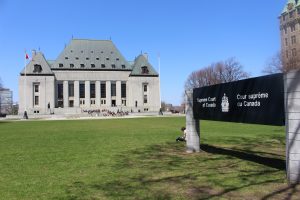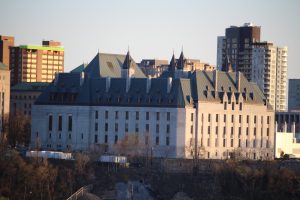- Alberta Court of Appeal Steps into the Quagmire of Religious Disputes
- Supreme Court of Canada Decides to Hear The Wall Case: Is A Church Member Entitled To Sue A Congregation Because He Was Disfellowshipped?
- Canadian Council of Christian Charities Granted Intervener Status in Wall Case
- CCCC Makes Oral Argument At Wall Case
- Bussey – National Post Op-Ed: Courts have no business reviewing religious decisions
- Bridge City News Interviews Bussey on the Wall Case
- Supreme Court of Canada: Churches Free to Determine Membership Requirements and Disciplinary Process Without Judicial Review
- Bussey’s Commentary on Wall Decision Recognizing The Freedom of Religious Communities To Make Decisions on Membership & Internal Rules

Here is the head note of today’s decision. Check back to this blog for more commentary:
The Highwood Congregation of Jehovah’s Witnesses is a voluntary, religious association. A member must live according to accepted standards of conduct and morality. A member who deviates and does not repent may be asked to appear before a Judicial Committee of elders and may be disfellowshipped. In 2014, W was disfellowshipped after he engaged in sinful behaviour and was considered to be insufficiently repentant. The decision was confirmed by an Appeal Committee. W
filed an originating application for judicial review pursuant to Rule 3.15 of the Alberta Rules of Court seeking an order of certiorari quashing the Judicial Committee’s decision on the basis that it was procedurally unfair. The Court of Queen’s Bench dealt with the issue of jurisdiction in a separate hearing. Both the chambers judge and a majority of the Court of Appeal concluded that the courts had jurisdiction to consider the merits of the application.
Held: The appeal should be allowed and the originating application for judicial review should be quashed.
Review of the decisions of voluntary associations, including religious groups, on the basis of procedural fairness is limited for three reasons. First, judicial review is limited to public decision makers, which the Judicial Committee is not. Not all decisions are amenable to a superior court’s supervisory jurisdiction. Judicial review is only available where there is an exercise of state authority and where that exercise is of a sufficiently public character. Judicial review is a public law concept that allows courts to ensure that lower tribunals respect the rule of law. Private parties cannot seek judicial review to solve disputes between them and public law remedies such as certiorari may not be granted in litigation relating to contractual or property rights between private parties. Simply because a decision impacts a broad segment of the public does not mean that it is public in the administrative law sense of the term nor would incorporation by a private Act operate as a statutory grant of authority to churches so constituted. The present case raises no issues about the rule of law. The Congregation in no way is exercising state authority.

Second, there is no free-standing right to procedural fairness absent an underlying legal right. Courts may only interfere to address procedural fairness concerns related to the decisions of religious groups or other voluntary associations if legal rights are at stake and the claim is founded on a valid cause of action, for example, contract, tort or restitution. Jurisdiction cannot be established on the sole basis that there is an alleged breach of natural justice or that the complainant has exhausted the organization’s internal processes. It is not enough that a matter be of importance in some abstract sense. W has no cause of action. No basis has been shown that W and the Congregation intended to create legal relations. No contractual right exists. The Congregation does not have a written constitution, by-laws or rules to be enforced. The negative impact of the disfellowship decision on W’s client base as a realtor does not give rise to an actionable claim. The matters in issue fall outside the courts’ jurisdiction.
Third, even where review is available, the courts will consider only those issues that are justiciable. The ecclesiastical issues raised by W are not justiciable. Justiciability relates to whether the subject matter of a dispute is appropriate for a court to decide. There is no single set of rules delineating the scope of justiciability. The court should ask whether it has the institutional capacity and legitimacy to
adjudicate the matter. Even the procedural rules of a particular religious group may involve the interpretation of religious doctrine, such as in this case. The courts have neither legitimacy nor institutional capacity to deal with contentious matters of religious doctrine.


Glad the Supreme Court had the wisdom to upheld the freedom of association and keep the distinction between jurisdictions. Thanks for the update.
Tell W he is a lucky man. No more donations, no more boring meetings, no door knocking on Saturday mornings, No more street stalls. Go to the beach!